On April 3, 1783, the US signed the Treaty of Amity and Commerce with Sweden, the first such treaty between the US and a country that wasn’t an ally in the Revolutionary War.
In April 1782, Benjamin Franklin and other American Peace Commissioners began peace talks with Great Britain, in the hopes of bringing about an end to the Revolutionary War. As soon as these talks began, Sweden’s King Gustavus III immediately pushed for a treaty of his own with the United States.
Gustavus wanted Sweden to be the first country not at war with England to establish an alliance with America. He also specifically requested that the talks be negotiated with Benjamin Franklin, for whom he had great respect. Congress agreed to the talks and made Franklin, minister plenipotentiary to Sweden. Congress was anxious for Franklin to secure the treaty, as it would mean recognition of American independence by another European country.
Because Franklin was already in Paris for the British talks, the meetings were held there with the Swedish ambassador to the court of France, Count Gustaf Philip Creutz. Franklin and Cruetz began their discussions on December 18, 1782. Each of them had proposed treaties from their own governments that they compared. The US had a treaty with 18 articles and Sweden one with 27. The American proposal was based on a draft of the treaty with the Netherlands. Meanwhile, the Swedish proposal was largely based on the recently completed Franco-American Treaty of Amity and Commerce with some parts taken from the treaty with the Dutch.
Franklin and Cruetz found that the two treaties differed on several points. Cruetz then forwarded the American draft to his king and the negotiations slowed, as they waited for an answer. In the meantime, the US and England reached an armistice on January 20, 1783, bringing an end to the fighting. Within days, Cruetz reported back to the king that Franklin agreed to accept the Swedish treaty as it had been written. As the US and British treaties moved forward, Cruetz was anxious to complete his treaty, so that Sweden could be the first to sign a treaty with the new nation.
So on the morning of February 5, he and Franklin both signed the treaty. Franklin also agreed to keep the treaty secret until it was ratified to prevent other powers from rushing to get theirs done too. The same day they signed the treaty, Cruetz received word from his king not to sign anything until the US-British treaty was published in London. So Cruetz and Franklin then signed an undated version of the treaty and burned the previous dated versions. While they waited for final word on the US-British treaty, King Gustavus sent back word that he would agree to add four articles from the American treaty to the Swedish one.
Franklin and Cruetz then added in these new articles and signed the documents on March 5. They were still waiting to hear about the US-British treaty but were in a rush to complete their work. So they dated the documents April 3, 1783. Sweden ratified the treaty on May 23 and Congress on September 25. The ratifications were then exchanged in Paris on February 6, 1784.
Click here to read the full treaty.
Click here for more Sweden stamps.
Learn more about Sweden’s postal history.
| FREE printable This Day in History album pages Download a PDF of today’s article. Get a binder or other supplies to create your This Day in History album. |
Discover what else happened on This Day in History.


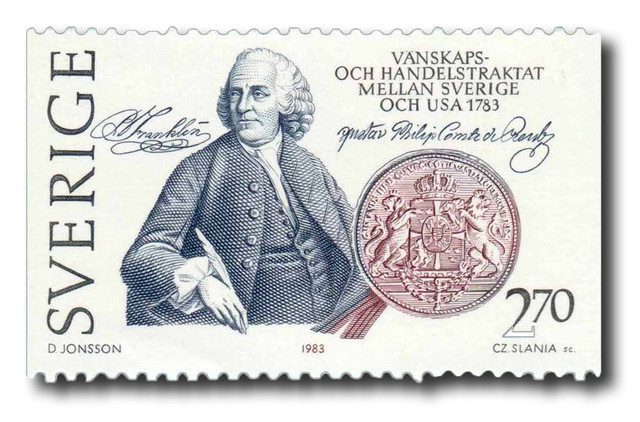
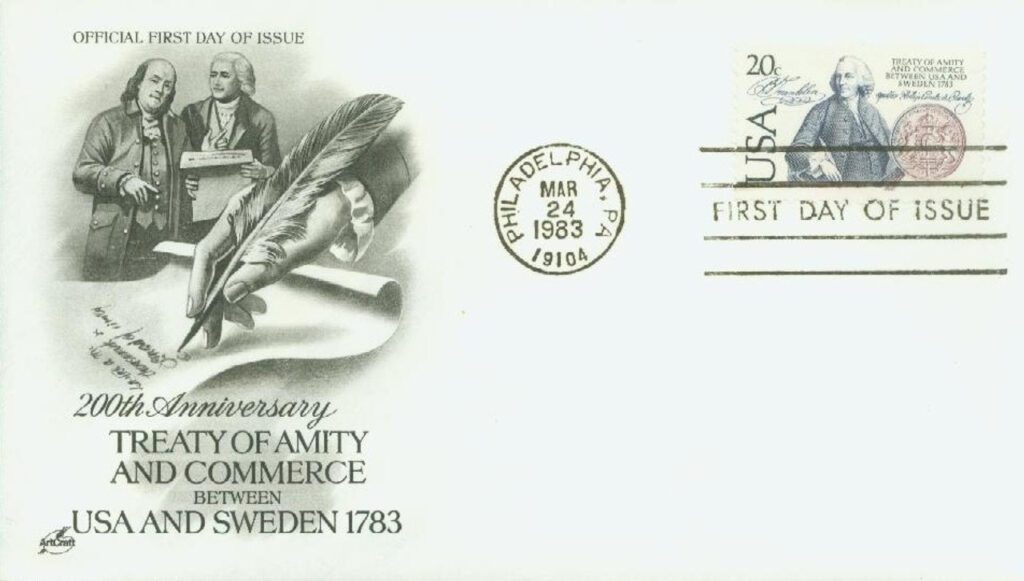
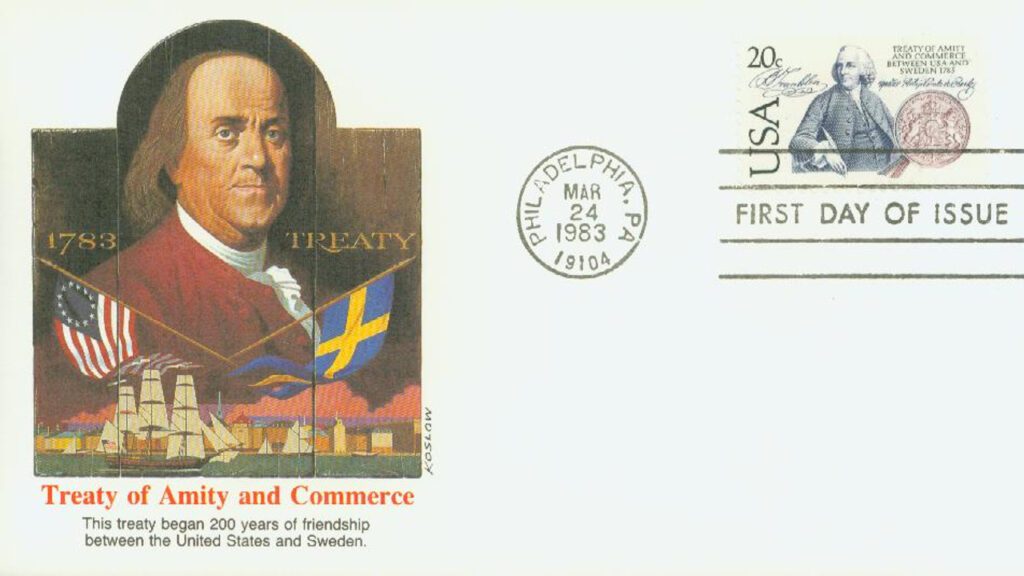
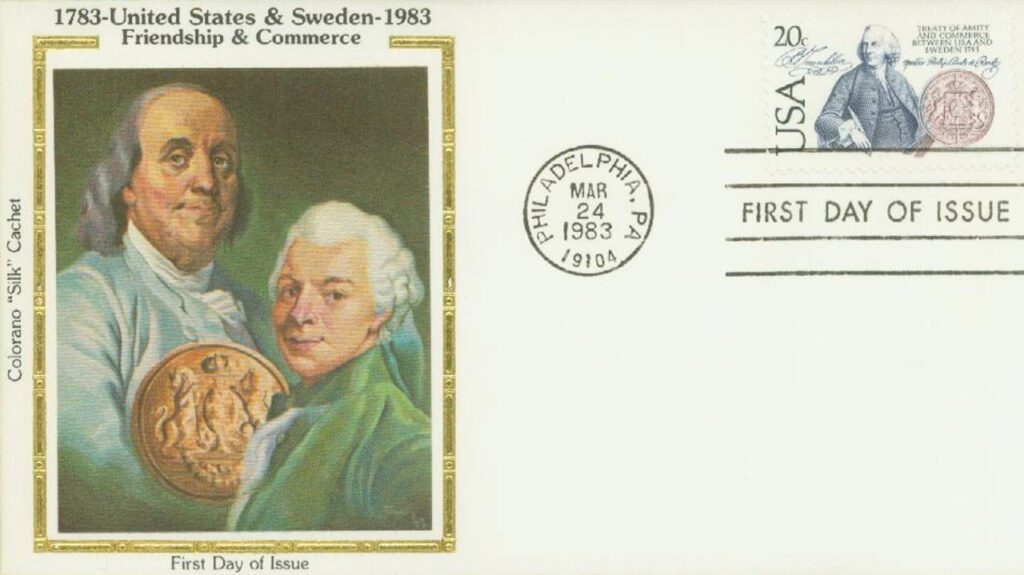
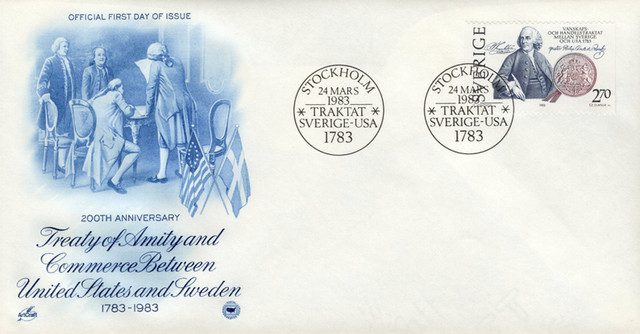
AS always , another interesting piece of US history oftern ignored.
Thanks, Mystic, for adding this story to my knowledge of our history during that period.
Franklin was a brilliant diplomat to whom America and Sweden should be eternally grateful.
“The American proposal was based on a drafted treaty with the Netherlands, while the Swedish one was based on a recently completed Dutch-American one.”
What is the difference: Dutch and the Netherlands? or
should a difference nation/state be listed instead of ____ ?